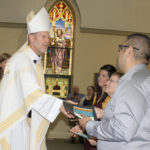By Patrick Schmadeke
Evangelization in the world today Column
The biblical scholar Raymond Brown once said “the Church has always been a mess.” I came to appreciate this the more I studied Church history. Pick any window of time from the last two

millennia, do a deep dive and behold the mess that is the Church. The more one zooms in on the details, the more human frailty is brought into relief against the backdrop of our divine mission of evangelization. In our own age, a central challenge we face is the wave of disaffiliation from the Church.
The drop in Church affiliation, especially among youths, young families and even middle-aged families is unprecedented. The Church has survived many struggles but we have to be honest that we’ve never faced this challenge before. It is hard to overstate the scale of our present crisis. The statistics on this phenomenon are staggering.
The path forward includes no easy remedy. No mechanistic solution will do — a program, a marketing strategy, a one-time event. Part of the problem is that we’ve often occupied ourselves with logistical concerns: does the boiler work? Does the printer need more ink? Did someone change that light bulb yet? These are essential questions but they are not the mission.
In the Church, we sometimes find ourselves deferring to old habits, ways of doing things and a check-list mentality that makes us feel like things are getting done without pausing to wonder if the things getting done are worthwhile. If we have habits that focus our attention on the logistical or maintaining the status quo, then it might be worth asking if we’re getting in the Holy Spirit’s way.
Pragmatism, a habitual concern with the most immediate logistical need, puts us in a rut and pragmatism is unable to get us out of the rut. The challenge of disaffiliation is relational, so we must conceive of a relational turn in all we do. This is harder than being pragmatic. It is also more human, more practical and more real. Both the interpersonal and institutional are important in this turn to relationship.
Local parish councils and school boards have identified the need to focus on welcoming and belonging in our diocese over the next year. This is not about adding one more thing to the to-do list. Instead, it is about integrating welcoming and belonging into everything we do.
On the personal level, the opening line of Vatican II’s Gaudium et Spes could be a point of reflection: “The joys and hopes, the griefs and the anxieties of the people of this age, especially those who are poor or in any way afflicted, these are the joys and hopes, the griefs and anxieties of the followers of Christ.” It provokes the question: how do I join the joys and help bear the sufferings of others? Our personal answer reflects whether we value belonging.
On the institutional level, the Joy of the Gospel #29 could be a guidepost: “The parish is not an outdated institution; precisely because it possesses great flexibility, it can assume quite different contours depending on the openness and missionary creativity of the pastor and the community.” Furthermore, “if the parish proves capable of self-renewal and constant adaptivity … this presumes that it really is in contact with the homes and the lives of its people, and does not become a useless structure out of touch with people or a self-absorbed group made up of a chosen few.”
If future generations look back to our moment of Church history, the fruitfulness of our present actions will depend on whether we attended to relationships. What is personal is a choice for each of us to make. The result on the aggregate remains to be seen. What is institutional requires communal discernment; synodality is an aid to this discernment. The fruitfulness we need won’t be like flipping on a switch. We cannot expect such rapid change. It will be something akin to an insight after the fact, a later realization about an evolution that already took place.
(Patrick Schmadeke is Director of Evangelization for the Diocese of Davenport.)











